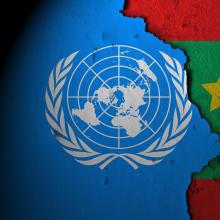February 06, 2025

Silhouette d'agent secret portant des casques contre l'emblème d'Interpol et le mur à texture bleue, tons clairs; Autriche, Vienne, 30 janvier 2024. Licensed under Shutterstock.
MENA Rights Group
7-9 Chemin de Balexert
1219 Châtelaine
Genève, Suisse
INTERPOL General Secretariat
200 Quai Charles de Gaulle
69006 Lyon
France
Subject: Agreement for a new Regional Bureau for the Middle East and North Africa in Saudi Arabia
Dear Secretariat of INTERPOL,
Following the announcement of a “Host Country Agreement” between your organisation and Saudi Arabia, we would like to draw your immediate attention to some concerning issues that demonstrate Saudi Arabia’s unsuitability to host a regional office. As such, we urge you to reconsider this agreement, and abide by INTERPOL’s human rights obligations and constitutional responsibilities.
Saudi Arabia unsuitability as host for INTERPOL regional office
First of all, Saudi Arabia is notoriously known for using its criminal legal framework such as the counterterrorism or the cybercrime laws to repress freedom of expression, within and outside its country. The 2017 Counterterrorism Law has been used against several human rights defenders to charge and sentence them to lengthy prison terms. We recall the case of Manahel al-Otaibi, recently sentenced to 11 years in prison for criticising Saudi laws regarding women’s rights on X (formerly Twitter), or Salma al-Shehab who is currently serving a 27-year sentence for similar acts.
Saudi Arabia is widely recognized for its systemic human rights violations and the absence of the rule of law. The country operates as an authoritarian regime, where dissent is repressed, individuals are routinely subjected to arbitrary detention, and due process is often denied. The lack of independent judiciary and transparent legal processes has allowed the state to wield its police apparatus to control and intimidate its citizens and critics alike. In such an environment, the establishment of an INTERPOL regional bureau risks not only the politicization of law enforcement activities but also the infiltration and misuse of the organization’s resources. Given the Saudi government's track record of exploiting international institutions for political leverage, there is a grave concern that this move will facilitate the further erosion of human rights protections and could lead to the misuse of INTERPOL’s services for the suppression of legitimate dissent.
Saudi Arabia also has a long-standing record of extraditing individuals in violation of the principle of non-refoulement. Saudi authorities are currently threatening to extradite Ahmed Kamel, an Egyptian individual who had been living in Saudi Arabia for ten years, to Egypt, where he will undoubtedly face acts of torture and ill-treatment. Kamel’s extradition would be politically motivated, as he is wanted by Egypt solely for his peaceful participation in Arab Spring protests.
Concerns about the role of the Arab Interiors Ministers’ Council (AIMC)
We, at MENA Rights Group, are highly concerned about the newly established Regional Bureau the Middle East and North Africa’s plan to “work closely” with structures such as the Arab Interiors Ministers’ Council (AIMC) to “strengthen cooperation and information sharing”. This is particularly concerning considering that this institution has been involved in circulating arrest warrants issued by Arab League Member States requesting the extraditions of human rights defenders and dissidents, in complete disregard for the principle of non-refoulement enshrined in article 3 of the UN Convention against Torture.
This was notably the case for Hassan al-Rabea, a Saudi national from the Shi’a minority, who was swiftly extradited from Morocco to Saudi Arabia following an arrest warrant issued by Saudi authorities, although he was clearly exposed to a risk of torture in his country of origin. Several of his relatives had also been executed for their belonging to the Shi’a minority or are on death row, which placed him at heightened risk of being sentenced to death.
Despite the well-founded risks that his extradition would constitute a violation of the principle of non-refoulement, the arrest warrant was nonetheless circulated by the AIMC and he was extradited to Saudi Arabia, where he has been detained for two years today.
As his case illustrates, we are concerned that the Saudi authorities will increasingly use accusations of terrorism to request the extradition of people outside the kingdom. This is all the more worrying as many Saudi opponents and critics are in exile and risk extradition every time they travel to an Arab League member country.
Before supporting efforts of the States of the region in their fight against transnational crime and terrorism, we ask you to be mindful of the systematic use of terrorism charges to prosecute any dissenting voices, including those living abroad.
MENA Rights Group has documented further instances of unlawful extradition proceedings facilitated by the AIMC, including the infamous case of Egyptian political satirist Sherif Osman, who was at risk of being extradited from the United Arab Emirates to Egypt following a warrant circulated by the AIMC, and has strong reason to believe that there are currently more active cases of human rights defenders and dissidents who are at risk of being extradited on the basis of arrest warrants circulated by the AIMC.
INTERPOL must conduct adequate due diligence
Unfortunately, we have serious concerns that INTERPOL has not always conducted adequate due diligence following such arrest warrants or Red Notices by repressive states, and that it has allowed its tools to be used by such actors to facilitate transnational repression.
In this context, we would like to recall that INTERPOL is bound by the Universal Declaration of Human Rights (UDHR) according to article 2 (1) of INTERPOL’s Constitution, including the prohibition of torture enshrined in article 5 of the UDHR and the right to freedom of expression and peaceful assembly in articles 19 and 20 of the UDHR. In addition, article 3 of INTERPOL’s Constitution prohibits extraditions on political grounds. Your organisation should therefore not be partnering with any country or institution that has a clear record of violating these articles.
In light of this, we call on INTERPOL to refrain from implementing the “Host Country Agreement” with Saudi Arabia, and to cease its partnership with the AIMC. At the very least, we invite you to reconsider your decision to open a Regional Bureau in Saudi Arabia.
We stay at your full disposal should you need any further information from us.
Kindly yours,
MENA Rights Group and ALQST for Human Rights.






